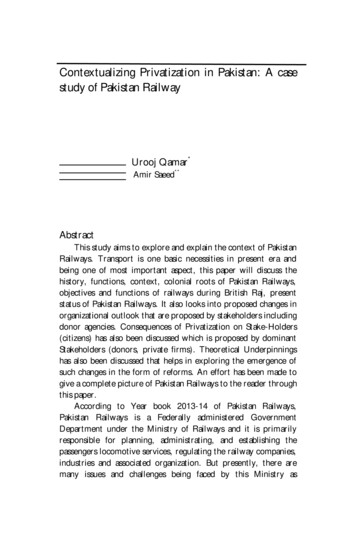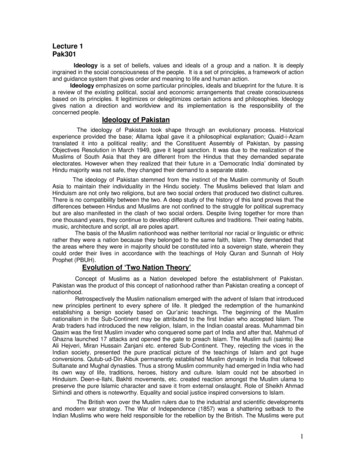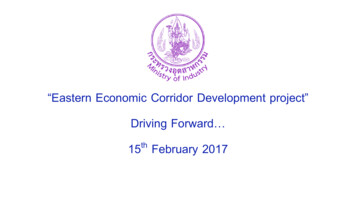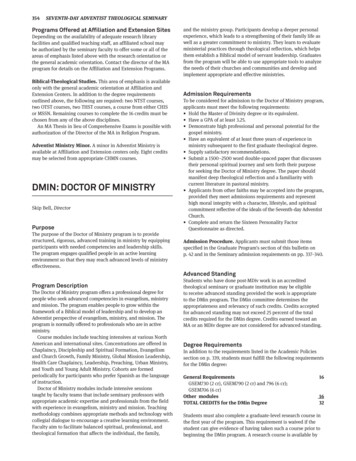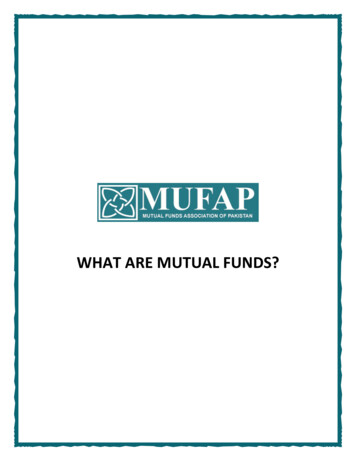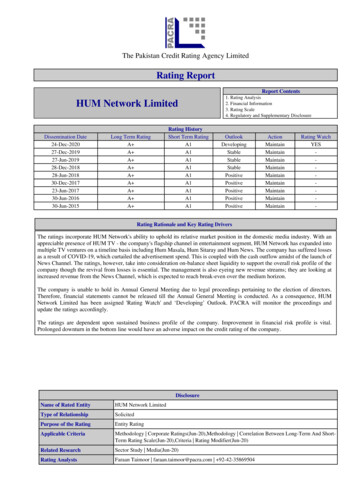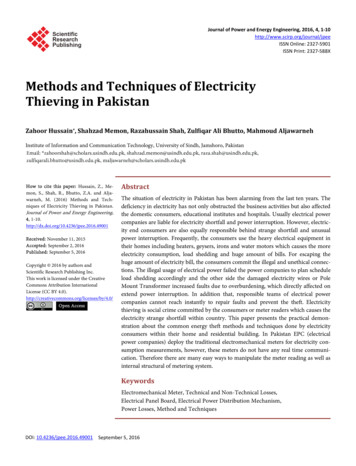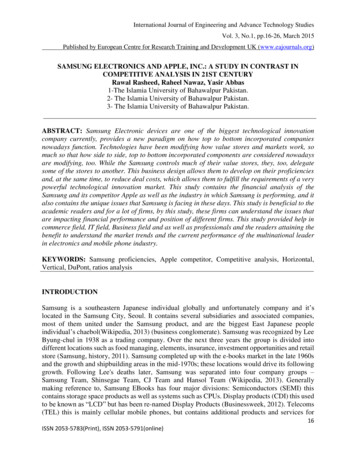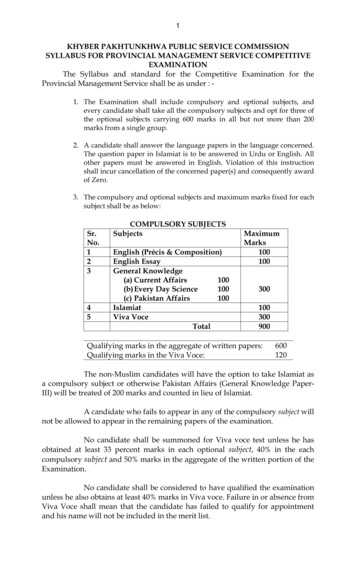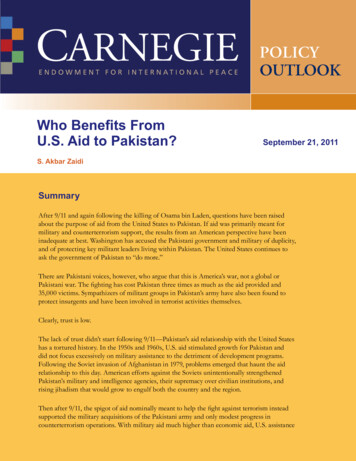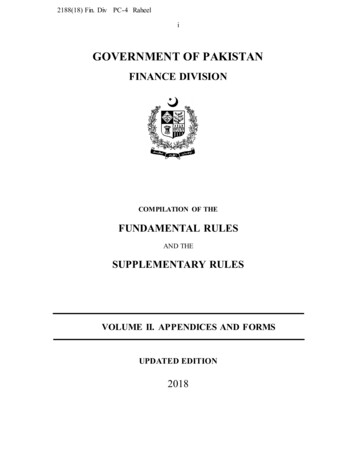
Transcription
2188(18) Fin. Div PC-4 RaheeliGOVERNMENT OF PAKISTANFINANCE DIVISIONCOMPILATION OF THEFUNDAMENTAL RULESAND THESUPPLEMENTARY RULESVOLUME II. APPENDICES AND FORMSUPDATED EDITION2018
ii
iiiTable of ContentsAPPENDICESS. 314TitleMemorandum explanatory of each rule in the Fundamental Rules(Not printed).Memorandum explanatory of the treatment accorded in theFundamental Rules to each Article in the Civil ServiceRegulations (Not printed)Administrative instructions in connection with the FundamentalRulesDelegations made by the President under Fundamental Rules 4and 6Rules regulating the grant of Overseas Pay (Not printed)Re-employed Personnel (conditions of service) Rules, 1932 (Notprinted).Domicile Questionnaire. (Not printed)Rules regarding the grant of free passages framed by theSecretary of State in Council (Not printed)Travelling, etc., Allowances of persons proceeding to placesoutsides Pakistan on official business and those posted inPakistan Missions abroad while travelling on duty abroad excepton transferRevised leave Rules, 1980The Prescribed Leave Rules 1955Instructions issued by the Auditor-General under FundamentalRule 74Study leave rules prescribed by the President under FundamentalRule 84List of British Dominions and Colonies in which leave salarymay be drawn in sterling (Not printed)Model terms for the grant of leave to Government servantsengaged on contract who are under the rule making control ofthe PresidentOrders issued by the President under Fundamental Rule 114Rates of contribution payable on account of pension and leavesalary during foreign serviceMemorandum explanatory of each rule contained in theSupplementary Rules (Not printed)Authorities which exercise the powers of a competent authorityunder the various Supplementary Rules made by the PresidentList of Officers declared to be heads of Departments for thepurpose of the Supplementary 8-929292-9393-9495-979798-113114-121
List of Officers who have been specially classed into the first orsecond grade for the purpose of calculating TravellingAllowance (Not printed)List showing rates of Travelling allowance of line staff of theTelegraph Engineering Branch for journeys on tourList of permanent Travelling Allowance (Not printed)List of Conveyance AllowanceList of special rates of daily allowanceList of localities where road mileage and daily allowance atincreased rates are admissibleList of officers not entitled to travelling allowance for journeyson tour (Not printed)List of special case in which conveyance hire has been granted(Not printed)List of officers of the Pakistan Posts and TelegraphsDepartments by whom the possession of private conveyancesmay be considered to be in the interests of public service andwho are entitled to recover the actual cost of transporting theirconveyances on transfer, under Supplementary Rule 116 (a) I(iv)(2) (Not printed)List showing the scales of travelling allowances drawn by thePosts and Telegraphs Officials who move between hills andplains (Not printed)Rate of travelling allowance admissible to Posts and Telegraphsofficials deputed to undergo a course of training (Not printed)List of Exceptions referred to in Supplementary Rule 184 (Notprinted)List of controlling officers in the Posts and TelegraphsDepartment (including audit) for purposes of TravellingAllowances (Not printed)List of authorities in the Pakistan Posts and TelegraphsDepartment empowered to grant leave (Not printed)Schedule of fees (Not printed)Model Agreement forms for recruitment of officers (Not printed)Central Services (Medical Attendance) Rules, 1958Federal Services Medical Attendance Rules, 1990Statutory provisions regarding terms and conditions of 26126127127127127127128-139140141-147148-152
vPREFACE TO THE UPDATED EDITIONThe Fundamental Rules and Supplementary Rules (FR & SR) define anddetermine the financial terms and conditions of government employees like pay,allowances, leave and travelling allowances etc.2. FR&SR Volume II was last published in 1985. Updated edition 2018incorporates all the amendments authorized in the Rules upto June, 2018. Editing andprinting errors of 1985 editions have also been corrected and omissions rectified. Theimportant orders issued and decisions taken by the government have also beenincorporated in it. In order to meet the pressing demand for this compilation, the existingrules are being published as they stand with modifications.3. I appreciate the hard work done by the team of Ministry of Finance(Regulation Wing) for their diligent efforts in the compilation and revision of FR&SR.This work is certainly a step forward in the direction of good governance, transparency,openness and regulatory convenience. This compilation of FR and SR will also beavailable on Finance Division‘s web www.mof.gov.pk.4. It would be appreciated if any errors or omissions, found in FR&SRVolume-II, are brought to the notice of Ministry of Finance.Finance SecretaryGovernment of PakistanIslamabad, Dated: 14-11-2018.
vi
1FUNDAMENTAL & SUPPLEMENTARY RULESAPPENDICES AND FORMSAPPENDIX No. 1Memorandum explanatory of each rule in the Fundamental Rules.(Not Printed)APPENDIX No. 2Memorandum explanatory of the treatment accorded in the Fundamental Rules toeach Article in the Civil Service Regulations.(Not Printed)APPENDIX No. 3Administrative instructions in connection with the Fundamental RulesThe President is pleased to make the following rules, in connection with theFundamental Rules, in respect of Government servants under his administrative control.1I. CONDITIONS OF AGE ON APPOINTMENT TO GOVERNMENT SERVICEA person whose age exceeds 25 years may not ordinarily be admitted into thepensionable service of the State without the sanction of the Head of a Department. Theordinary limit is extended to thirty years in the case of a person appointed to a Judicialoffice.Note.—This Rule does not apply to the employment in civil capacities ofreservists and pensioners of the Pakistan Army.Government Decisions.—(1) It is intended, as far as possible, to eliminatepersons entering service at advanced ages and subsequently entertaining grievances thatthey are not allowed to continue in service till they earn the full pension. If in any specialcase, therefore, the Head of a Department should desire to make an exception to this agelimit, the recruit should be made aware, at the time of recruitment, of the fact that he isunlikely to be able to earn full pension.[G.I. F.D., endorsement No. F. 6 (23)-R. II/40, dated 21st May, 1940]1Minors, i.e. persons who have not attained the age of 18 years should not be appointed to posts for which security is require d.[Note below Rule 192 (2) of Posts and T elegraphs Manual Vol. II].
2(2) It has been decided in consultation with the Federal Public ServiceCommission that both minimum and maximum age limits should be prescribed for directappointment to various posts under Government in the recruitment rules for the postsconcerned. It has also been decided that in the cases in which minimum age limit has notbeen prescribed in the existing recruitment rules, such limit should be laid down inconsultation with the Establishment Division and the Commission.[Estt. Divn. O. M. No. 9/2/71-DV, Dated the 5th June, 1972].(3) In supersession of all existing instructions on the subject of age concession totribal candidates it has been decided that the upper age limit for recruitment to theservice/posts under the Federal Government should be relaxed by three years in the caseof tribal candidates belonging to the recognised tribes who are permanently residing inthe areas mentioned in the Schedule A to this office Memorandum and whose familieshave been living in those areas.[Authority.— OM. No. 2/6/66/DV, dated 23rd July, 1968]SCHEDULE ‗A‘1.Quetta Division.2.Kalat Division.3.Las Bela District of Karachi Division.4.Tribal areas of D. I. Khan & Peshawar Divisions (including Frontier Statesof Dir, Swat, Chitral and Amb).5.Former Excluded (Baluch) Area forming part of the Dera Ghazi KhanDistrict.6.Former tribal areas of Mardan & Hazara Districts.7.Nasirabad Sub-Division of Khairpur Division.8.Upper Tanawal Area of Hazara District.(4) Attention of the Ministries/Divisions etc., is invited to the EstablishmentDivision O. M. No. 10/5/60-DV, dated 6-11-1962, and Memo. No. 10/2/60-DV, dated17-9-1964 (printed at pages 462-463, Establishment Manual, Vol. III), and it is requestedthat in the light of the decisions contained therein provisions on the following lines maybe made in the recruitment rules:(i) In case of ex-cadre Gazetted posts.—―The maximum age limit will berelaxed in the case of released/retired officers of the Armed Forces ofPakistan up to a maximum of 10 years or by the number of years an officerhas actually served the Armed Forces, whichever is less‖.(ii) In case of non-gazetted civil posts which are filled otherwise than by acompetitive examination held by FPSC.—―The maximum age limit will berelaxed in the case of released/retired personnel of the Armed Forces of
3Pakistan up to a maximum of 10 years or by the number of years a personhas served the Armed Forces, whichever is less‖.(iii) In case of both ex-cadre gazetted posts and non-gazetted civil posts.—Released/Retired officers/personnel of the Armed Forces will be preferred tocandidates from the open market provided they possess the requisiteeducational and other qualifications and are otherwise suitable.Note:—For the purpose (i) above, ex-cadre posts means odd jobs or isolatedposts.[Authority. O. M. No. 5 (l) 2/65-DV, dated the 10th March, 1966].Annexure I(Establishment Division O. M. No. 10/5/60-DV., dated the 6th November, 1962)The Government of Pakistan have decided that:(i) in filling ex-cadre posts, released/retired officers of the Armed Forces shouldbe preferred to candidates from the open market, provided they possess therequisite educational and other qualifications and are otherwise suitable, and(ii) the maximum age limit, if any, may be relaxed up to a maximum of years orthe number of years an officer has actually served, whichever is less.2. The decision is brought to the notice of all Ministries/Divisions with therequest that all concerned under them may be informed of the decision for compliance.Annexure II(Establishment Division Office Memorandum No. 10/2/60-D.V., dated the 17thSeptember, 1964).The question of employment of Armed Forces (non-commissioned) personnel incivil posts has been under consideration for sometime past and it has now been decidedthat in filling civil posts, released/retired personnel of the Armed Forces should bepreferred to candidates from the open market, provided they possess the requisiteeducational and other qualifications and are otherwise suitable. It has further beendecided that the maximum age limit, if any, may be relaxed up to a maximum of 10 yearsor the number of years a person has actually served the Armed Forces, whichever is less.2. It is requested that the above decisions may please be brought to the notice ofall concerned for compliance.
43. In accordance with the rule contained in Section I of the Rules framed inconnection with the Fundamental Rules vide Appendix 3 to the Fundamental andSupplementary Rules, Vol. II, a person whose age exceeds 25 years should not ordinarilybe admitted into pensionable service of the State without the sanction of the Head of theDepartment concerned. As a result of the upper age limit for admission of candidates toappear in the Ministerial Services Examinations conducted by the Federal Public ServiceCommission having been prescribed beyond the age of 25 years, some persons have beentaken into pensionable service on the results of those Examinations at an age exceeding25 years. The question as to whether individual sanction admitting such persons intopensionable service should be issued by the Department concerned has been underconsideration and the President has been pleased to decide that the appointment of thepersons who are nominated on the results of the Federal Public Service Examinations andwhose age at the time of entry into pensionable serve exceeds 25 years may be deemed tohave been sanctioned by the competent authority in terms of the Rule contained inSection I, Appendix-3 to Fundamental and Supplementary Rules and no individualsanction in this behalf is necessary in such cases.[G.P., M.F., O.M. No.F.6(1)-R.I(l)/57, dated the 6th March, 1957].II. —(a) CHARGE OF OFFICE1. Unless for special recorded reasons (which must be of a public nature) theauthority under whose orders the transfer takes place permits or requires it to be made inany particular case elsewhere, or otherwise, the charge of an office must be made over atthe headquarters, both the relieving and the relieved Government servants being present.2(1) The Auditor General of Pakistan may delegate to a subordinate authority thepower to relax, for special and recorded reasons of a public nature, the provisions of thisrule in the case of any class of Government servants serving under him whose transferhas been ordered by competent authority not higher than that of the Auditor General ofPakistan.(2) Sanction to the delivery of charge away from headquarters but within thejurisdiction of the officer relieved, may be accorded by Minor Local Government and byheads of 3Federal Departments in respect of all Government servants serving under them2T he Governor General in Council has had under consideration the question whether in cases involving transfer of charge of an officeelsewhere than at headquarters the exact nature of the reasons should be expressed on the fact of the record. He has decided that thisshould be done and audit officers have been instructed to challenge all orders in which the exact nature of the reasons underlying themhas not been explained. Authorities exercising the power are expected to take into consideration, before issuing the orders, the exactfinancial effect which such orders will produce.[G.I.F.D., No.F.227-C.S.R./26, dated 23 rd July, 1926]3Substituted by Ministry of Law Notification No.F.24(2)/75-Pub., dated 01-8-1975, Gaz. Of Pak., Extra., Pp.435-436, dated 01-81975.
5who are transferred under competent authority. In special case where the Head of theMinor Local Government or 4Federal Government Department desires, for particularreasons connected with the public service, to confer at his own headquarters with therelieving Government servant before the latter enters upon his local duties, he may permitthe transfer to be made at his own headquarters.(3) The condition imposed by this rule that both the relieving and the relievedGovernment servants must be present is not enforced in the case of Government servantswho are permitted to combine vacation with long leave under Fundamental Rule 81. Insuch cases the following procedure has been laid down:—(a) When vacation is prefixed to leave the outgoing Government servant willreport, before leaving headquarters, or if for urgent reasons the leave isgranted during vacation, as soon as it is granted that he makes over chargewith effect from the end of the vacation. The relieving Government Servantwill then take over charge at the end of the vacation in the ordinary way.(b) When vacation is affixed to leave the Government servant to be relieved willmake over charge in the ordinary way before the vacation, the incomingGovernment Servant on return at the end of the vacation taking over chargewith effect from the beginning of the vacation.Note.—It has come to notice that cases of transfer of charge of an officeelsewhere than at headquarters are becoming somewhat more frequent than formerly. Inthe circumstances it has been decided that to ensure the prevention of any possible abuseof the spirit of the rules the necessary orders in all such cases should either be issued bythe Secretary of the Ministry concerned or embody the fact of his approval having beengiven.2. As a general rule, and subject to any special orders to the contrary inparticular cases, the headquarters of a Government servant or the staff of a Government,as, for instance, a Secretary to a Government, or a clerk in a Government secretariat arethe headquarters, for the time being, of the Government, to which he is attached.3. The headquarters of any other Government servant are either the stationwhich has been declared to be his headquarters by the authority which appoints him, or,in the absence of such declaration, the station where the records of his office are kept.Note.—An authority mentioned in the annexed schedule may, to the extentindicated therein delegate its powers under this rule to Heads of Departments.4Substituted by Ministry of Law Notification No.F.24(2)/75-Pub., dated 01-8-1975, Gaz. Of Pak., Extra., Pp.435-436, dated01-8-1975.
6(b)LEAVING JURISDICTION1. No Government servant (other than a police officer acting within his legalpowers) is entitled to pay or allowances for any time he may spend beyond the limits ofhis charge without proper authority.2. An authority mentioned in the annexed schedule may authorise anyGovernment servants under its control to proceed on duty to any part of Pakistan whetherwithin or beyond its own jurisdiction, or to any State which has acceded to Pakistan.A Government servant permitted under this rule to proceed to any place on dutymay take with him such establishment and records as are absolutely necessary for theefficient discharge of his duties.3. A controlling officer (see Supplementary Rule 191) may allow anyGovernment servant subordinate to him to proceed on duty to any part of the territories ofhis local Government or to a District or Foreign State adjoining the jurisdiction of thecontrolling officer and to draw travelling allowance under rule.Note.—Any authority mentioned in the annexed schedule may, to the extentindicated therein, delegate to a subordinate authority the power to fix, or change, theheadquarters of Government servants serving under the letter who are appointed byhigher authority.4. An Accountant General may pass pay and allowances to the Head of anAdministration under the latter‘s own orders for any period during which he may beabsent from his jurisdiction and to any member of his personal or secretariat staff.III.5IV.SUBSISTENCE GRANTS. (Deleted.)COMMITTALS TO PRISON (Deleted.)V.(1)LEAVEProbationers and ApprenticesLeave on medical certificate under Fundamental Rule, 104 (a) (ii) shall not begranted for a period extending beyond the term of a Government servant‘s contract unlessor until it has been decided to retain him in permanent employment.(2)Casual LeaveFundamental Rule 85 does not refer to casual leave for short period. Such leave isnot recognised and is not subject to any rule. Technically, therefore, a Government5Deleted vide G.P.F.D., O.M. No.F.1(3)-R.I/80, dated 20-04-1982.
7servant on casual leave is not treated as absent from duty, and his pay is not intermitted.Casual leave, however, must not be given so as to cause evasion of the rules regarding.—(i) date of reckoning pay and allowances,(ii) charge of office,(iii) commencement and end of leave,(iv) return to duty,or so as to extend the term of leave beyond the time admissible by rule.It has been ruled that the State should not be put to extra expense in consequenceof the absence of an officer during holidays or on casual leave.(G.I., F.D., No.215, dated 14th March, 1894).Overtime allowance granted to the staff in the Telegraph Engineering and TrafficBranches of the Posts and Telegraphs Department should be excluded from the scope ofthese orders.[Financial Adviser (Communications) endorsement No. A. 10-9/43, dated the30th March, 1946].As an exception to the general principle laid down in this footnote, the Presidenthas decided that in the R. M. S. if no leave preserve sorter is readily available to performthe work of an absentee on casual leave and work of the absentee cannot be held up ordistributed amongst the staff on duty and a substitute (i. e., a sorter at rest) should not berecovered from the absentee, but should be paid by the Pakistan Posts and TelegraphsDepartment.This has effect from the 1st March, 1938.(F. O. Communication, endorsement No. Es. A.-26/36-Coll 2, dated 18th February, 1938).Note 1.—In the Postal Department substitutes may be employed in the place ofpostmen and postal 6(Grade 1-2) servants (other than runners) who may be grantedcasual leave, under the rules laid down in the enclosure to Industries and LabourDepartment letter No. 20-P.T.E., dated the 28th August, 1926, as subsequently modifiedvide Government of India, Department of Communications corrigendum No. Es. B602/34, dated the 30th March, 1938.[Finance Officer (Communications) endorsement No. E.S.A.147/39/24, dated the18-11-1939.]6Substituted vide Estt. Division‘s Notification No.S.R.O.1530(I)/73, dated 3-11-1973.
8Note 2.—In the Railway Mail Service substitutes may be employed in the place ofmail guards, van peons, porters and other inferior servants who may be granted casualleave, under the rules laid down in the enclosure to Industries and Labour Departmentletter No. Est. B./APC. 66/28, dated the 11th January, 1930.Note 3.—In departmental telegraph offices substitutes may be employed in placeof Grade 1-2 servants (other than boy peons) who may be granted casual leave under therules laid down in the enclosure to Industries and Labour Department (Posts andTelegraphs Branch) letter No. Es. B. 60-2/34, dated the 30th July, 1936, as amended bythe Government of India, Department of Communications Corrigendum No. Es. B-602/34, dated the 30th March, 1938.[G.I., F.D., Resolution No. F.7(39)R.I/36, dated the 20th August, 1936 and F.O.Communications Endorsement No. Es. B. 60-2/34, dated the 30th March 1938].Government Orders.—(1) It has been decided that ‗Thari‘ employees of thePosts and Telegraphs Department serving in the desert talukas of the Thar Parkar Districtproceeding on casual leave to their native places in the desert, may be allowed wheneverthe journey from their headquarters to their native places and back takes more than 3days, allowing 20 miles a day as the rates of travelling, an extra day for every extra 20miles of the journey.(F.O.C‘s endorsement No. Es. B-51-5/38, dated the 16th February, 1939).(2) According to the administrative instructions in para V (2) of Appendix 3 ofthe Fundamental and Supplementary Rules Volume II, casual leave should not be grantedto a Government servant so as to cause evasion of the rules regarding return to duty.Similarly, according to Govt. Order under F. R. 51-A the grant of return passage toPakistan on conclusion of deputation abroad is conditional on the official‘s return to dutyforthwith on the conclusion of the deputation, unless the arrangement to the contraryeffect had been specially permitted at the time of the deputation closes, or is about toclose, and the proposed leave is begun. A question has been raised as to whether in viewof these instructions the grant of casual leave to a Government servant deputed outsidePakistan on temporary official duty or on training, either before the commencement orafter the expiry of the sanctioned period of deputation, which would have the effect ofextending his stay outside Pakistan, would be in order. The matter has been considered inthis Ministry and it is clarified that although there is no absolute bar on the grant ofcasual leave outside Pakistan in such cases, it should ordinarily be discouraged andshould be allowed only in exceptional circumstances.[G.P.M.F. O.M. No. F.8(7)-R.2 (RWP)/61, dated the 17th November, 1961].Auditor-General‘s decision.—It has been decided by the Auditor General, withthe concurrence of the Government, that the practice of granting casual leave on half pay
9or without pay is not covered by paragraph (V) 2 of the Administrative Instructions.Under that paragraph as it stands, full pay can be allowed to Government Servants oncasual leave. If, in any case, less than full pay is allowed, it would amount to animposition of a penalty not provided for in rule 3 of the rules issued with the Governmentof India Home Department, Notification No. F. 9-19-30, dated the 27th February, 1932[Auditor-General‘s letter No. T. 797-A/108-34, dated the 1st August, 1934].(3)Quarantine Leave(1) Quarantine leave is in the nature of extra casual leave and a substitute shallnormally not be employed during the absence of a civil servant on such leave.7Provided that where the exigencies of service are compelling the head of theoffice may employ a substitute for reasons to be recorded in writing.(2) A civil servant may be granted quarantine leave outside his leave account tothe extent that his authorized medical attendant recommends and the period of such leaveshall be treated as duty with full pay and allowances of the post held by him at the time ofproceeding on leave.(4)Recall from leave.Orders recalling a Government servant on leave out of Pakistan should becommunicated to him officially through the Ambassador of Pakistan.VI. —FOREIGN SERVICE(1) Procedure for payment of contribution.—A copy of the orders sanctioninga Government servant‘s transfer to foreign service must always be communicated to theAccounts Officer (referred to in rule 2) by the authority by whom the transfer issanctioned. The Government servant himself should, without delay, communicate a copyto the officer who audits his pay, and take his instructions as to the officer to whom he isto account for the contribution; report to the latter officer the time and date of all transfersof charge to which he is a party when proceeding on, while in, and on return from,foreign service; and furnish from time to time particulars regarding his pay in foreignservice, leave taken by him, his postal address and any other information which thatofficer may require.(The authority by whom the transfer is sanctioned or the authority which iscompetent to sanction promotion or reversion in the parent department, if such authority878Substituted by rule 37 of the ‗Revised Leave Rules, 1980‘ issued vide S.R.O.1313(I)/80, dated 20-12-1980.Inserted by G.P., M.F. Notification No.F.10(10)-R.II(II)/57, dated the 25-3-1959.
10be different from the authority sanctioning the transfer, shall send an intimation to theAccounts officer (referred to in Rule 2) about the Government servant‘s promotion orreversion, in his parent department, in order to enable the latter to effect the recovery ofmonthly contribution of pension on the basis of the grade which the Government servantwould have held in a temporary, officiating or substantive capacity in his parentdepartment, from time to time, if he had not been transferred to foreign service).2. (a) In the case of foreign service out of Pakistan, the ―Account Officer‖ is theAccountant General, Pakistan Revenues.(b) In the case of foreign service in Pakistan.(i) If pay in foreign service is paid from a Government treasury, and issubject to audit by an audit officer of Government, the Account Officeris such audit officer;(ii) otherwise, the Account Officer is the Accountant General of theprovince in which the Municipality, Port Trust or other body concernedis situated, or in the case of service under a State which has acceded toPakistan, the Accountant General who is in account with the Stateconcerned.Note.—In the cases of Governments in Commercial Departments (e. g., Railwaysand Posts and Telegraphs) employed on foreign service in or out of Pakistan the“Account Officer” is the Account Officer of the Department concerned.Auditor-General‘s decision.–Branch Audit Officers being the Account Officersof the Posts and Telegraphs Audit Office Establishments are responsible for watching andadjusting recoveries of contributions (on account of leave salary or pension or both as thecase may be) in respect of the personnel lent from their offices to other Governments orDepartments or on foreign service.(Auditor General‘s C. O. No. Admn. 29/327-41, dated the 10th Jan. 1942).Accountant-General‘s Instructions. In respect of the Post and TelegraphDepartment, the Account Officers are the Deputy Accountants General in independentcharge of the Branch.[A.G.P. & Ts. endorsement No. Mis.-1971/F-90-II (Vol. 2), dated 16th December, 1924].Government Decision.—All Ministries/Divisions should ensure that in future allsanctions regarding the deputation on foreign service are invariably addressed to AccountOffices concerned. While sanctioning the transfer of a government servant on foreignservice, the monthly rates of pension contribution should be invariably indicated in the
11sanction. These rates are given in Appendix 11-A of FRs & SRs Vol. II and may bereferred to by the Departments concerned. The rates so indicated by the Departmentsconcerned may be provisionally adopted for depositing the contributions promptly andregularly every month till the final rates are intimated by the Audit and Accounts Officeson receipt of which the excesses/deficiencies, if any, can be adjusted. The Audit andAccount Officers will check the accuracy of the rates and watch the recoveries of thecontributions and their proper accounting in the government accounts.(2)Rules regarding leave and grant of leave.1. A Government servant on foreign service in Pakistan is himself personallyresponsible for the observance of the rule contained in Fundamental Rule 122; byaccepting leave to which he is not entitled under the rules he renders himself liable torefund leave-salary irregularly drawn, and in the event of his refusing to refund, to forfeithis previous service under Government, and to cease to have any claim on Government inrespect of cither pension or leave-salary.VII.TRAVELLING ALLOWANCES(1)Transfer not on public grounds.(a) When
APPENDICES AND FORMS UPDATED EDITION 2018 2188(18) Fin. Div PC-4 Raheel . ii . iii . may be drawn in sterling (Not printed) 92 . available on Finance Division's web www.mof.gov.pk. 4. It would be appreciated if any errors or omissions, found in FR&SR Volume-II, are brought to the notice of Ministry of Finance. .

